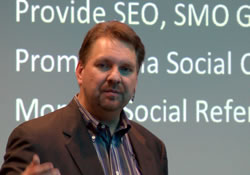 After the kick-off keynote by Joe Pulizzi at the recent edition of Content Marketing World in the US and the keynote by Jay Baer, who was one of the keynote speakers at the first Content Marketing Conference Europe, Lee Odden talked about the future of content marketing at the flagship event of the Content Marketing Institute.
After the kick-off keynote by Joe Pulizzi at the recent edition of Content Marketing World in the US and the keynote by Jay Baer, who was one of the keynote speakers at the first Content Marketing Conference Europe, Lee Odden talked about the future of content marketing at the flagship event of the Content Marketing Institute.
The future of content marketing. It’s a topic that often comes back, even if there is still a lot to do in the present for most organizations. But as Lee was one of the first to have a more holistic take on content marketing, was a great speaker at our Fusion Marketing Experience where he presented his book Optimize, and was a keynote at our first European Content Marketing Conference too, let’s take a look at his predictions regarding the future of content marketing.
The future of content: the context of information, technology and the human experience
Lee discussed the future of content on search and the social Web. It’s a topic he talked about earlier too and is a lot about the same holistic/connected/integrated approach with the connected customer at the center. Some future content marketing and content trends as Lee, who gave a presentation on customer-centric content marketing strategy at the Fusion Marketing Experience 2012 (slideshare below), sees them.
Let’s start with some content and content marketing evolutions as they happened and continue to happen:
- The consumer (certainly in retail) is moving from multi-channel to omni-channel (physical and digital in-store touchpoints included).
- Single format storytelling has evolved into transmedia storytelling and will keep doing so.
- The future of content has to be seen in the relational context of information, technology and the human experience with content.
- One of the main drivers shaping the future of content and content marketing will remain the channel-agnostic focus on target audiences with the “best answer” for what customers want (or content for what they like) in mind. And the customer journey remains the key driver in this context.
What’s next for content and content marketing?
Now some more trends looking a bit further in the future as it starts today:
- The importance of mobile devices, wearable computing, etc. will impact the future of content (and context). Also the use of apps will strongly impact the content experience.
- Adaptive and responsive (and even pro-sponsive) content will become more important. In other words: fast reaction to real-time events will become essential. It’s in this context that we also should look at content marketing from the big data and personalization context (with fast data in some cases).
- Converged media will become more important. In the end, that’s also what connected and customer-centric marketing is about and let’s face it: in the end, the somewhat strict distinction between paid, owned and earned media was a bit artificial.
- Co-creation and collaboration will broaden the content creation and workflow ecosystem, involving multiple contributors but also customers and this is where the importance of social content comes in as well.
- Visual content will become more important.
- An integrated approach whereby the silo challenges are tackled as well as search and social integration play an important role.
In the end, the future of content remains one of a holistic view on the customer journey that is more connected than ever. That holistic perspective is also what Lee’s book, Optimize, is all about.
The basics of content as an answer to questions and needs (as the often mentioned example of another Content Marketing World speaker, Marcus Sheridan, and his swimming pool content shows), as emotional triggers and as a means to an end, being action, remain.
Technology and especially mobile, social, search and (big) data, will play an essential role. And as always it will all be about smart and thus by definition connected and customer-centric business. More openness and a more ‘human’ approach is another ongoing evolution Lee sees happening.

